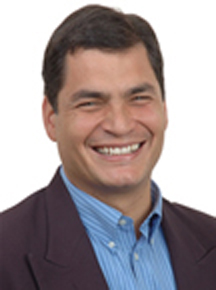QUITO, (Reuters) – Presi-dent Rafael Correa vowed a shake-up of Ecuador’s courts after a referendum strengthened his grip on the South American OPEC member nation while heightening foes’ fears of autocratic rule.
Votes being counted into yesterday showed the leftist leader ahead on all 10 reforms he put to Ecuado-reans in a referendum that is an early indicator of Correa’s prospects in a possible 2013 re-election bid in the resource-rich Andean country.
“We’ve won — thank God and the people!” said Correa, 48.

With 33 percent of ballots counted, the “Yes” votes range for the questions was 44 to 50 percent compared with 40 to 44 percent for “No” — a narrower margin than most had forecast but possibly reflecting opposition strength in urban areas counted first.
Along with Correa’s declaration of victory soon after polls closed on Saturday, major opposition leaders accepted defeat and government supporters celebrated in Quito.
In office since 2007, Correa should now be empowered to name one of three members of a panel charged with reforming the judiciary and appointing judges to the Supreme Court and lower courts. Allies will effectively choose the other two members.
“If we don’t transform the judiciary we won’t be able to transform the country,” Correa said in an interview with TV network Telesur on Sunday. “Of course I’m meddling in the judiciary, but my hands are clean. These are the hands of 14 million people in Ecuador, the hands of democracy.”
Other reforms should allow the government to limit media ownership and hold journalists “responsible” for stories — moves critics say threaten freedom of expression.
Victory should also help Correa to rein in dissent in the ruling Alianza Pais movement and better control parliament.
“Correa’s victory makes it difficult to talk in any serious way about the separation of powers in Ecuador,” said a U.S. analyst of the region, Michael Shifter.
Having won two presidential elections, Correa is widely expected to try again, although the father-of-three has said he may prefer to retire with his wife to her homeland in Belgium.
“I have talked to our sources in Quito and they said they thought this was going to be the beginning of the 2013 campaign,” said Eurasia Group analyst Risa Grais-Targow.
“TIME FOR
MEDITATION”
Analysts do not expect Correa to take any drastic new measures against foreign investors, whom he has already largely strong-armed into deals more favorable to the state.
“I think in the oil sector he’s really already gone as far as he can go,” Grais-Targow said, referring to the recent renegotiation of foreign companies’ contracts in Ecuador.
The energetic and eloquent Correa forms part of an alliance of leftist Latin Ameri-can presidents that includes Hugo Chavez in Venezuela and Evo Morales in Bolivia.
Chavez congratulated his “brother” for a “great victory.”
Constant critics of U.S. “imperialism,” both men have sought to boost state revenues from oil and mineral resourc-es, which have allowed them to spend heavily on the poor.
Major opposition figures acknowledged Correa’s win but said he should take a conciliatory attitude given that the margin did not appear to be as big as the government had forecast.
“It wasn’t a thrashing,” the president’s brother and critic Fabricio Correa told Reuters. “It’s time for meditation not triumphalism.”









